Carlo Bugatti was an Italian artist and designer who is famous throughout the world for his unique extravagant style.
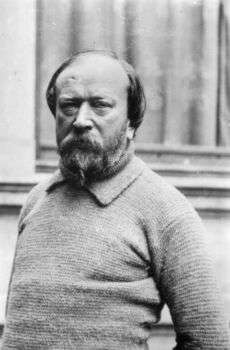
Image source: https://en.wikipedia.org/wiki/Carlo_Bugatti#/media/File:Carlo_Bugatti_(1920).jpg
About His Life
Carlo Bugatti was born in Milan on February 16, 1856. He studied at the Brera Academy in Milan and at the Académie des Beaux Arts in Paris. After opening his workshop in Milan by 1898, he was featured at exhibitions in Turin and in Paris. Then, Bugatti immigrated to Paris, in 1904, with Teresa, his wife, and his three children. There, he opened another workshop for the production of luxury goods. After the death of his wife and youngest son, he moved in with his son Ettore near the Bugatti car plant in Molsheim. Then, Bugatti died in April 1940.
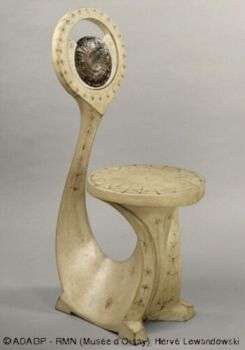
Image source: https://search.creativecommons.org/photos/ae1d5365-4637-4a82-8889-b04eea4d15c7 by lartnouveauenfrance
His Major Works
Carlo Bugatti devoted much of his research to round and arched forms, which found their way into the Turin International Exhibition of Contemporary Decorative Arts in 1902. There, his Snail Room, built in a spiral around a rod depicting the head of an animal, made a splash. The four chairs and a table in the center of the room are sculptures, in which the strength of the form matches the subtlety of the ornament. Additionally, an international jury gave the highest award to the artist who was hailed as “the first in Italy to bring contemporary furniture to life, not dream.” The Cobra Chair, part of a large set of furniture designed for the Snail-room, foreshadows the Art Deco style.
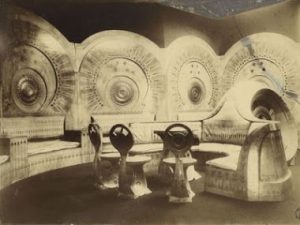
Image source: https://search.creativecommons.org/photos/356b0404-2aaf-41d2-adfb-5e16b690c4e2 by lartnouveauenfrance
Another one of Bugatti’s works, the Curule Armchair or Throne Chair (1905), was made of walnut and blackened wood, and inlaid with pewter, copper, brass, and bone details. Additionally, Bugatti’s use of varying textures is interesting, and it reinforces the sense of dynamic tension created by the lack of symmetry.
Also, his tea and coffee set are particularly impressive. In 1907, he created boar’s head, elephant-trunk, and dragonfly-themed sets.
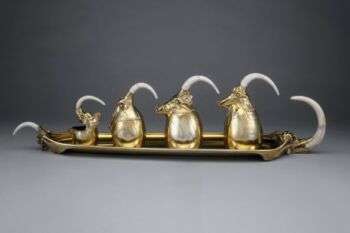
Image source: https://www.clevelandart.org/art/1980.74
Features of Bugatti’s Style
His style is highly individualist, although he drew on Gothic, Moorish, and Oriental influences and the work of Violet le Duc. Further, his work demonstrates the most confident use of a simple powerful form, which is sometimes geometric and sometimes organic.
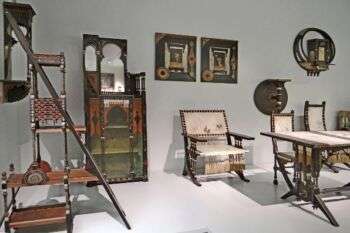
Milan
Image source: https://search.creativecommons.org/photos/8c346416-e1d7-4aad-8b06-755d0e131eab by dalbera
His style set him apart from the fashion trends of the early 1900s. Also, animals and nature inspired him. So many items, which were made from parchment, bone, mother-of-pearl, pewter, copper, and other exquisite materials, were meticulously crafted in a variety of colors and textures with decorative motifs reminiscent of dragonflies.
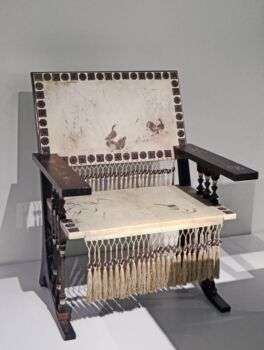
Image source: https://search.creativecommons.org/photos/28735093-d208-4ad0-97e0-e4cffaf0f988 by dalbera
Info sources:
